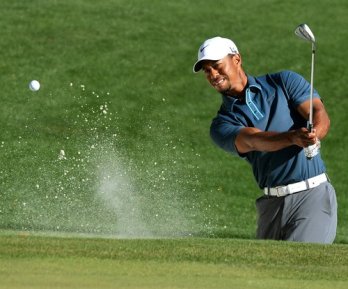Did you hear about Tiger’s predicament at this year’s Masters?
After physical and marital troubles the past few years, Tiger Woods has not only reclaimed the number one spot in golf, but appeared on his way to win his 6th Masters earlier this month until… uh-oh… “Woods awoke Saturday having to defend himself against a rules violation he committed in the second round,” The New York Times writes (Apr. 13).

What, a penalty for Tiger? Must be a mistake.
“He was three strokes off the lead, held by Jason Day,” The Times said, “at the completion of Friday’s second round. On the 15th hole, Woods’s third shot hit the flagstick and rolled off the green and into the water. After taking a one-stroke penalty, Woods dropped his ball in the fairway, a few feet behind his original divot to give himself a more comfortable distance to the pin for his wedge shot. It was a good tactic — his ball stopped 3 feet from the pin — but it also violated Rule 26 [I hate that rule!] which states that when choosing to drop near one’s original divot, a golfer should play his ball ‘as nearly as possible’ at the spot from which the first ball was played.”
“You know, I wasn’t even really thinking,” Woods said Saturday. “I was still a little ticked at what happened and I was just trying to figure, ‘O.K., I need to take some yardage off this shot.’ Evidently, it was pretty obvious I didn’t drop it in the right spot.”
However, it might surprise you to know who caught the Rule 26 violation.
“Before Woods finished his second round, a television viewer texted a Masters rules official to call attention to the infraction. The rules committee, led by Fred Ridley, reviewed Woods’s drop and saw nothing wrong. In a television interview after his round, Woods said he purposely dropped the ball two yards behind his first divot, which raised some questions in Ridley’s mind.”
The official spoke with Tiger by phone that night and informed the champ that he had indeed violated Rule 26 and would be facing a two-stroke penalty. However, it could’ve been worse!
“Woods could have been disqualified for signing an incorrect scorecard. In allowing him to remain in the field, the Rules Committee invoked Rule 33-7, which allows a penalty of disqualification to be waived or modified in exceptional cases. The rule was instituted in 2011 to protect the players from retroactive disqualifications in instances in which armchair rules officials called in from home, as happened Friday, to report incidental violations that can be picked up on high-definition telecasts, like touching a twig on a backswing or a ball oscillating on the green.”
This caused me to think, what about other rules of golf. Apparently, The Times’ Bob Eckstein had similar thoughts. Here are a few that Eckstein found:
Advice and/or Assistance – “You can taunt your opponent, but you can’t help him. In other words, it is fine if Player A says, “Nice swing, you kept your head down,” if Player B has just sliced his drive deep into the woods. But “Nice swing, you kept your head down” after Player B splits the fairway is a two-stroke penalty. If Player B responded sarcastically, “Really?” that’s fine. But a sincere “Really?” is an appeal for advice and, again, a two-stroke penalty.”
Indicating Line of Play – “A player may not stand or walk behind his opponent’s line of putt. The penalty is two strokes. But it is three if he or she is also humming, dancing or waving.”
Unusual Use of Equipment – “It’s O.K. for players to stretch their arms or squat while waiting at the tee, but the use of a doughnut weight or a rubber resistance cord attached to the bag or flagstick is not. A player cannot even lean against a ball washer with the intent to stretch his Achilles’ tendon without being disqualified. Likewise, if you see players giving one another back rubs at the tee box, get on the phone immediately to the PGA (Rule 8-3.45a).”
As for Woods not being disqualified, the PGA official “said that Augusta National officials did not consider disqualifying Woods on Saturday because it would have been ‘grossly unfair’ to do so when officials had not talked to him about the drop before he signed his scorecard Friday. Asked if he was concerned with the perception that Woods might have received preferential treatment as the world’s top-ranked player, [the official] said: ‘I can’t really control what the perception might or might not be. All I can say is that unequivocally this tournament is about integrity. If this had been John Smith from wherever, he would have gotten the same ruling because again, it is the right ruling under these circumstances.’ ”
Rules are rules, except when they apply to golf, then they’re sacred.
Comments










